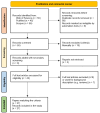Using Postbiotics from Functional Foods for Managing Colorectal Cancer: Mechanisms, Sources, Therapeutic Potential, and Clinical Perspectives
- PMID: 40572223
- PMCID: PMC12195411
- DOI: 10.3390/microorganisms13061335
Using Postbiotics from Functional Foods for Managing Colorectal Cancer: Mechanisms, Sources, Therapeutic Potential, and Clinical Perspectives
Abstract
Postbiotics, defined as a preparation of inanimate microorganisms and/or their components, including metabolic byproducts, have gained recognition as promising modulators of gut health and disease, offering advantages over probiotics in terms of safety, stability, and formulation. This systematic review investigates the therapeutic potential of postbiotics derived from functional foods in the context of colorectal cancer (CRC), a leading cause of cancer-related mortality worldwide. Despite encouraging preclinical findings, translation into clinical practice remains limited due to a paucity of robust human trials, revealing a significant gap and the need for further translational research. Key bioactive categories of postbiotics are described, alongside their anti-inflammatory, immunomodulatory, and chemopreventive mechanisms. Through comprehensive literature mapping, this review uniquely categorizes research according to the experimental models employed, i.e., in vitro, in silico, in vivo, and ex vivo, and advanced models such as organoids and organ-on-chip platforms. The latter offers greater physiological relevance by closely mimicking human tissue architecture and microenvironment. These models help demonstrate how postbiotics may influence tumorigenesis through mechanisms involving inflammation, apoptosis, epigenetic regulation, and the maintenance of gut barrier integrity. Finally, the review summarizes recent innovations in their delivery strategies and calls for comprehensive mechanistic studies and high-quality clinical trials to validate postbiotics as safe and effective adjuncts in CRC prevention, therapy, and management.
Keywords: advanced preclinical models; carcinogenesis; chemoprevention; colorectal cancer; disease modelling; functional food; postbiotics.
Conflict of interest statement
The authors declare no conflicts of interest.
Figures




References
Publication types
Grants and funding
LinkOut - more resources
Full Text Sources
Miscellaneous

